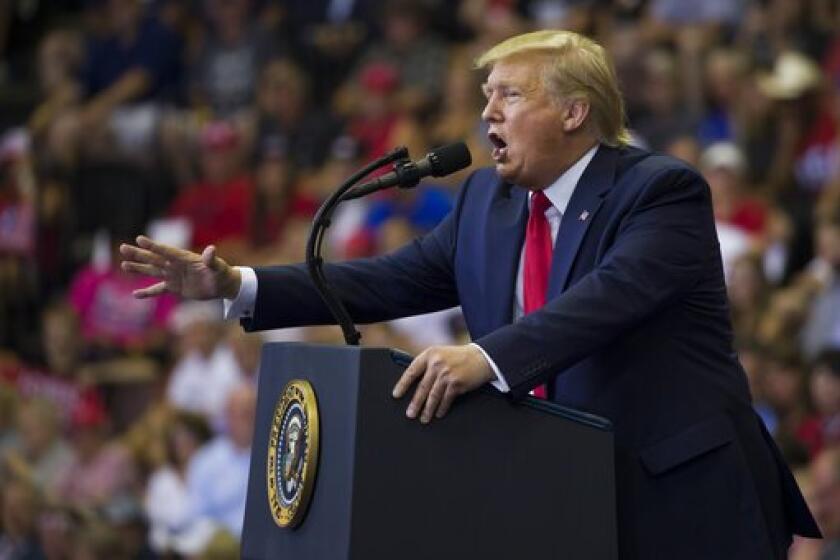Newt Gingrich Lying? We’re Shocked, Totally Shocked!
- Share via
WASHINGTON — So now the House Ethics Committee, after scrutinizing Speaker Newt Gingrich (R-Ga.) for many inconclusive months, says it will investigate him on the charge of telling less than the truth during the investigation itself. The committee has launched the Lying Bomb--the big one, the accusation that everyone understands and no one excuses. If the committee had not gone nuclear in this way, its probe of Gingrich would be sinking into oblivion.
This year’s election campaigns are far from over, but President Bill Clinton’s high poll numbers already show that voters have grown tired of political finger-pointing. Rational politicians would respond to this change by easing up on the ethics accusations.
But the moral-outrage business is not rational. It is more like a bacterium whose fierce will to live counters each successive antibiotic deployed against it by becoming a new, more resistant strain. The offenses alleged against Gingrich are hardly intelligible, let alone shocking. But the new allegation--that he lied about the old allegations--is one Gingrich’s fellow politicians cannot ignore, because they think people in general will not ignore it.
Democrats began by complaining to the Ethics Committee that Gingrich had violated federal tax laws by using tax-deductible contributions to teach a nonpartisan college course that was, in fact, highly partisan. This allegation trailed lesser charges behind it like ducklings.
The committee’s outside counsel produced a report. Democrats tried to have the report made public before the November elections. The GOP-controlled House beat back the attempt. There were standard accusations of cover-up.
Meanwhile, Gingrich’s opponents barely pretended the charges were serious. More often, they justified their attacks by pointing to precedent. In the 1980s, Gingrich blazed a new political trail by hauling Democratic Speaker Jim Wright of Texas before the Ethics Committee and thus forcing him from office.
Thus, Gingrich’s critics said, the current speaker fairly earned the investigation of himself--if only because he deserves their revenge.
Then, less than a week after these ho-hum proceedings, the Ethics Committee escalated by introducing, on its own initiative, four new charges.
One new count excited political onlookers: The committee said it would investigate whether “in the course of communicating with the committee” Gingrich had given “accurate, reliable and complete information” about his college course, his foundation and the political-action committee he headed at the time.
“This is a whole new ball game,” House Minority Whip David E. Bonior (D-Mich.) said. “Setting Off Alarm Bells,” one news story headlined, saying the new charge meant trouble for Gingrich because the issue of lying to investigators often proved more important than the issues that set off the investigation.
To judge by the quick, uniform response, U.S. political culture has become almost simple-minded on the issue of lying. Whenever someone can establish that a politician has told something other than the literal truth, observers--the press, especially--can be counted on to cast swift, unalloyed opprobrium. The press is self-interested in this, of course: Journalists hold official feet to the fire on the “lying” issue partly to make it easier to report the news.
More generally, this country is morally absolutist about lying just as it is about much else--more moralistic than the Ten Commandments, certainly, which make useful distinctions and are most interested in the sins of swearing false oaths and bearing false witness against neighbors. During the Clarence Thomas hearings, sociologist Orlando Patterson suggested that Supreme Court nominee Thomas a) lied about his conversations with Anita F. Hill, and b) was justified in doing so, since the punishment proposed for him, the death of his nomination, was so far out of proportion to his offense. But Patterson’s argument disappeared from public view at warp speed--people did not want to contemplate its complications.
There is surely a case to be made for coming down hard on the offense of lying when it comes to the administration of justice. The adversary system is one way of eliciting truth; but the ability of a judicial system to function--whether in the House or elsewhere--also centrally depends on the expectation that all parties will feel bound to tell the truth. Otherwise, any judgments the system makes will rest on factual sand and lack both authority and usefulness.
Yet, there is an irony here. Because lying is so easily understood and widely excoriated, it can make a big scandal out of an otherwise uninteresting one. Precisely because it has this power, today’s political entrepreneurs often succumb to the temptation to make cynical use of it.
It is a near-universal rule that criminal and quasi-criminal investigations stir up falsehoods. Some are innocent: Records are inaccurate. Participants in a conversation interpret it differently. Others have more logic: People, in telling their stories, are self-exculpatory. They try to hide things that may have little to do with the investigation but are embarrassing in other respects. Sometimes, the falsehoods are conscious, sometimes, unconscious; in the middle area, those falsehoods half-known, half-unknown, produced in psychological panic. The more adversarial your investigation, the more distortion you will produce. You can count on creating untruths by inducing a sufficient degree of fear and panic in your enemy.
None of this absolves the person who does the factual embroidering. But it does spread the blame. Onlookers who profess themselves shocked--shocked!--to find lying and distortion going on in an investigation usually had a role in creating it. Sometimes, they know the consequences of their actions. If they do not, they should. After all these post-Watergate years, they cannot claim innocence.
Maybe Gingrich will be found out in an egregious lie--the equivalent of money in a secret Swiss bank account. More probably, the sins will be less heinous. If they are, it will not be enough for his opponents to shriek “less than the truth!” at him--as if that answered all moral questions. They should also have to explain to us how the discrepancies are clearly culpable, and clearly important.
More to Read
Get the L.A. Times Politics newsletter
Deeply reported insights into legislation, politics and policy from Sacramento, Washington and beyond. In your inbox twice per week.
You may occasionally receive promotional content from the Los Angeles Times.










